Peter MALONE
Saturday, 18 September 2021 19:32
Little World of Don Camillo, The
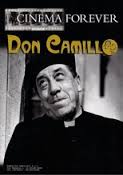
THE LITTLE WORLD OF DON CAMILLO
France/Italy, 1952, 106 minutes, Black and white.
Fernandel, Gino Cervi, Sylvie, Manara, Vera Talqui.
Directed by Julien Duvivier
The Little World of Don Camillo is something of a classic. Made in Italy in 1952 by French director Julien Duvivier (whose career had spanned the '30s to the '50s in France and in Hollywood - Tales of Manhattan, Flesh and Fantasy, Lydia).
The film comes from the period of Italian neo-realism and uses realistic settings of the Po Valley, small villages and their way of life in the late '40s and early '50s.
The film and its sequels were taken from very popular novels by Giovanni Guareschi. They were popular, not only in Italy, but also in English translations all over the world.
The film also has great strength from the presence and style of French comedian Fernandel as Don Camillo. Gino Cervi is very good as Peppone, the Catholic communist mayor who is in continual clash with Don Camillo.
The film offers wise, if lightly touched on, comment on the strange clash between Catholics and communists in Italy as well as the strength of both traditions in single individuals. This was strengthened, of course, by the experience of World War II and the partisans. The film echoes this tradition.
Of interest is the continued conversation that Don Camillo has with Jesus, pictured as the crucifix in the church, above the altar. Jesus continually chides Don Camillo and offers a great deal of wise and humane advice about ordinary living, the behaviour of priests, the role of the church, the role of politics - and not getting too het up about communism. There were several other versions of Don Camillo, including a German Italian co-production with Brian Blessed and Mario Adorf.
1.The popularity of the Don Camillo stories and movies? Echoing the '40s and '50s? In Italy, around the world? The themes of religion and communism? The strange blend of Catholicism and politics in Italy, especially the north?
2.The voice-over and the commentary on the Po Valley, on towns, on the uniqueness of the behaviour of the villagers in this town, on the events and on people?
3.The black and white photography, the Po Valley, the village, the authentic and realistic atmosphere? The musical score?
4.The post-war period, the memory of the partisans and their fight against the Nazis? The Christian Democrats and their emerging into power, the role of the Italian Communist Party? People as both communists and Catholics? The traditions of the church and its oppression? Rebellion against the church? The opening with the election and the popular response to the communists, to Peppone? The celebrations - and Don Camillo's boycotting them and ringing the bells?
5.The portrait of Don Camillo, Fernandel's appearance and comic style? The typical Italian priest, his soutane and biretta, his way of speaking? In the church, anti communist, the reaction to the election, the ringing of the bells? His being bashed and his throwing the eggs at his assailant? His personal confessions - and his manipulating the sports matches, offering bribes? The traditional people considering him a bolshevik priest? His relationship with people, the ringing of the bells, his assistant, the baptism of Peppone's boy, Gina and her wanting to marry, the family feuds, the sports matches and the injured umpire, the building of the people's palace, the carnival - and his head there being available for knocking down? Mrs Christina and her teaching, her death? His going on holiday, the reaction of the bishop - and his wanting people to farewell him and their not being there?
6.The importance of the conversations between Don Camillo and Jesus, the device of the voice-over, the figure on the crucifix? Don Camillo and his conversations with Jesus, prayer, natural? His defending himself - and Jesus attacking him? The humour and wisdom of Jesus' stances on the church, money, bribes, politics? His jokes? His genial humanism - even about Reds?
7.Peppone as mayor, the partisan tradition, his place in the village, his family? Winning the election, his loyal fans? Speeches, the birth of the baby? The Catholic tradition, the baptism - and the names of Camillo and Lenin? His reaction to the ringing of the bells, the fistfight with Don Camillo with the bells? His confession - after 30 years? The story about the eggs? The pleasant chats with Don Camillo, walking the village, sharing so much - yet the official antagonism? Sport, family feuds? The communist farewell at the railway station?
8.Christina, the teacher, the member of the opposition, her loyalty to the king, the extreme Right stances, her death and her final words?
9.Gina, her fiancee, their political clashes, meeting at the fence, their arguments? The Romeo and Juliet overtones? Coming to Don Camillo and wanting to marry, yet their arguments? The families, cantankerous, coming to Don Camillo - and accusing him of being a bolshevik?
10.The people in the village, their loyalties? The men on the council and their having to work in the fields, not being able to write properly - and coming to Christina, her lessons? Jesus explaining this to Don Camillo - and his putting graffiti on the notices?
11.The range of comedy and its light touch? Dialogue, situations, characters?
12.The two farewells - of the Catholics and of the communists and their loyalty to Don Camillo? A symbol of the contradictions in Italian Catholicism?
Published in Movie Reviews
Published in
Movie Reviews
Tagged under
Saturday, 18 September 2021 19:32
Lion Has Wings, The
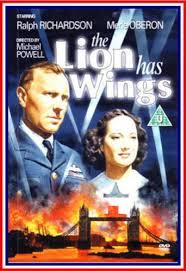
THE LION HAS WINGS
UK, 1939, 76 minutes, Black and white.
Merle Oberon, Ralph Richardson, June Duprez, Robert Douglas, Anthony Bushell, Derrick de Marney.
Directed by Michael Powell, Brian Desmond Hurst, Adrian Brunel.
The Lion Has Wings is a contribution by Sir Alexander Korda to British morale at the outbreak of World War II. It is a London Films production with all the finesse that Korda's organisation could bring to a film.
The film is mainly documentary. It has three directors including the celebrated Michael Powell, as well as Brian Desmond Hurst and Adrian Brunel. Merle Oberon, Ralph Richardson and other contemporary British stars appear very briefly.
While there is a very slight thread of narrative, focusing on Officer Richardson and his wife who becomes a nurse, Oberon, the film is mainly documentary.
The film goes back to Britain in the '30s and contrasts the free British lifestyle with that developing in Hitler's Germany. Editing highlights the contrast. The film also focuses on the attempts for peace during the '30s as well as Hitler's dramatic taking over of the countries surrounding Germany. It builds up to Chamberlain's Munich visit as well as his announcement of the state of war between Britain and Germany on 3 September 1939.
In the meantime, the film focuses on Britain's industry, its readiness for war, its development of tanks, guns, ammunition. It also highlights the move into the air - with long sequences of a British air show and moving into World War II and the description of missions over Germany. The film is particularly well made, anticipating so many of the war films as well as those of the post-war period which reflected on Britain's experience.
The film is very positive in tone, appropriately aggressive as well as morale-boosting. In fact, while it is dated in terms of the war effort, it is still an interesting documentary on Britain's image of itself in 1939, as well as its estimate of how ready it was for war and the attitude that Britain took into the war.
(Just for morale-boosting purposes, there is a flashback to Queen Elizabeth I, played again by Flora Robson, and the threat of the Armada.)
The film shows the strength of British documentary-making in the '30s. It also highlights Alexander Korda's contribution to the developing British cinema of the '30s and '40s.
Published in Movie Reviews
Published in
Movie Reviews
Tagged under
Saturday, 18 September 2021 19:32
Life Stinks
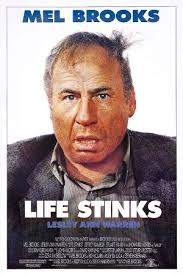
LIFE STINKS
US, 1991, 93 minutes, Colour.
Mel Brooks, Lesley Ann Warren, Jeffrey Tambor.
Directed by Mel Brooks.
Life Stinks was written and directed by Mel Brooks who is the star. Brooks has had a long career in cinema and television, especially with his capacity for parody. Here he has some parody, especially of such films as Sullivan's Travels and Preston Sturges' and Frank Capra's comedies of the past. However, at the end of the '80s, with the western world in recession, he veers towards more serious themes with sentiment and hopeful and optimistic endings.
Brooks, getting older, plays a wealthy tycoon who makes a bet that he can survive in East Los Angeles for a month. He meets bag lady, Lesley Ann Warren, as well as many drifters. He survives - but begins to understand something of their way of life. When he is betrayed by his rival, he goes berserk - but eventually gets the kind of revenge that is presented in so many American films, taking the part of the little people and moving against the wealthy developers.
The film is not hilarious like many of Brooks' films. However, there are some good jokes - but the overall tone is that of humour, sentiment, social criticism - and a hope for little people in the '90s.
1.The movies of Mel Brooks, expectations of comedy? His skill at farce and parody? Introduction of serious themes?
2.The world of Los Angeles, the world of the rich, East Los Angeles and the people in the street? The musical score, the opening march - and its being used throughout the film? The use of Easy To Love?
3.The '90s, the title, recession, wealth and poverty, hopes and dreams - echoes of Frank Capra-style movies?
4.Mel Brooks as Bolt, the big car, marching with his henchmen into the office, his ruthless listening to plans for destruction of buildings and harm for the poor? Crasswell and his manoeuvres, the bet, the lawyers - and their double-crossing Bolt? The contract? Not having any money, credit cards, his toupee removed, the signal on his leg?
5.Crasswell, his being a local boy, his ambitions, meanness, intruding into meetings, the contract and double-dealing, buying the lawyers? Closing the mission? Singing while it rained?
6.Bolt on the street - how real, how comic? The effect? The squalor, Sailor and the handkerchief, the pipes and the rats? Wanting to get into the hotel but not having the money? Not eating - and trying to steal food? The garbage tins? His shoes being robbed? His being hungry, sleeping, people urinating on him? Getting dirty? Yet meeting people and their helping him?
7.Molly, her place, her story, her depression, the robbing of the shoes, her place being set on fire? The revenge with the hot soup? Taking Bolt to the mission, eating, the friends? Helping, sharing, falling in love with him - and the Easy to Love dance routine? Going to his mansion with him, supporting him, the marriage?
8.Sailor and company, handkerchiefs, eating, living on the street, exposure and dying? His black friend? The range of vagrants, life on the street? At the mission?
9.The bet, the vice-versa theme, the arrogant wealthy man learning? The effect, his survival?
10.His return, Crasswell's fickleness, the party, wanting to take his art and treasures, his being prevented? His anger? His fighting with the man who thought he was John Paul Getty? Arrested, taken to hospital? His return, the confrontation with Crasswell with the opening of the estate? The parody of the battle of the earthmovers? Media interviews?
11.The finale with the wedding, the church (and the echoes of his watching the wedding)? The cinema optimism of the ending? The feelgood attitude, even though life stinks?
Published in Movie Reviews
Published in
Movie Reviews
Tagged under
Saturday, 18 September 2021 19:32
Life of Harry Dare, The

THE LIFE OF HARRY DARE
Australia, 1996, 90 minutes, Colour.
John Moore, Nicholas Hope.
Directed by Aleksi Vellis.
This offbeat Australian film is receiving limited release through the Australian Film Institute since the film was not picked up by commercial distributors. A pity, since this is an interesting film focussing on urban aborigines. Its star is John Moore (star of such films as Deadly and Blackfellas) and the setting is Adelaide. The film is a combination of murder mystery, detection, comedy and social comment. While it nods in the direction of American parallels, it has a strong local flavour and humour. But it also reminds Australian audiences of issues that are being discussed about aborigines and possibilities for development, family relationships, police. Not a big film but interesting and entertaining.
1.The combination of thriller, comedy, private eye and detection, social comment?
2.The Adelaide locations, the city, the wharves? The suburbs and the Aboriginal homes? The melting-pot? Musical score?
3.The crash, the flashbacks, the story? The mystery? Returning to the beginning? The end - tongue-in-cheek?
4.John Moore as Harry, screen presence and style? Harry and the voice-over? His background, life, self-appreciation?
5.The van, jail, Ben and the money, the curse? The stolen van, the police? The job? The ending?
6.Harry, his age and background, relationship with his father? The flashbacks? His happiness with his father? The mystery of his disappearance and death? Working on the van? Marriage, Jem and the romance? Marriage? The son? The build-up to the separation - Harry and his love for the van? The years passing? Getting jobs and failing? Mum, Ben? Dan and the taxi?
7.The police, their styles? Kevin? The offering of the deal about the drugs? The van and the black band? The kids and the drugs? In hospital? Police suspicions of Harry?
8.Jim and Harry and their relationship, detecting, talk, bonds? The uncle, the van gone, going to the pub, the clue with the matches, the pizza? Making the links? The discovery?
9.Action, behind the couch, the girl and the revelation of the truth, the fights, the chases, the crashes? Comedy action style?
10.The relationship between Luigi and Harry's father? Luigi's daughter and her rebelling? Max and the links? The band and their music? Psychological humour? Reconciliation and the truth?
11.Jem, going off, her anxiety, the climax and her involvement?
12.The picture of the police, the officer, the assistant? At work, dealing with Harry, prejudices? With the kids? The van, the chases, the finale?
13.The kids and the themes of drugs? The dangers for Aboriginal children? Children rebelling against their parents?
14.The workers, the scams, the revelation of the truth, Harry's father?
15.Urban Aboriginals and their culture? Black and white relationships? City life, traditions? Ben and his scene? The grandmother? The cousins?
16.Harry Dare as the hero of the private eye detection, the unwitting hero, relationship with his family, with his wife and son? The happy ending?
Published in Movie Reviews
Published in
Movie Reviews
Tagged under
Saturday, 18 September 2021 19:32
Life Classes
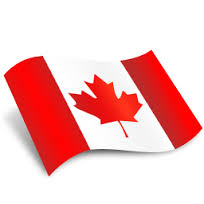
LIFE CLASSES
Canada, 1987, 117 minutes, Colour.
Jacinta Cormier, Leon Dubinsky, Francis Knickle.
Directed by William D. Mac Gillivray.
Life Classes was written and directed by William Dean Mac Gillivray. A small-budget director and an artist, his films include Stations and Understanding Bliss. This is his most straightforward feature of the '80s. Set in Nova Scotia, it focuses on Mary, a young woman from the Gaelic region of the island who leaves her home town and goes to Halifax. She is pregnant, wants to care for her daughter by herself. She works in a store, gets an invitation to pose for art classes. She learns to move from drawing and painting by numbers to work in her own creative way. She also participates in a media happening televised for Canada - and seen by all her relatives and friends on Nova Scotia through a new cable channel.
The film focuses on the journey of Mary, her growing in self-awareness and self-esteem. Finally, she asks the father of her daughter to pose for life classes and is able to mount an exhibition of her drawings and paintings.
The film is an excellent portrait of Mary, played by Jacinta Cormier. It is also an interesting study of an isolated community coming to terms with the 20th century and its technology. It also highlights life in the city - especially in the art world. However, it is very strong on Mary's interior journey, her relationship with her family, her grandmother, her father - and Earl, the father of her daughter and her daughter. It is a film of insight.
1.The work of William McGillivray? Small budgets, Canadian perspective? Sensitivity and insight?
2.The Nova Scotia locations, the countryside, Halifax and the modern city? The world of apartments, stores? Art classes, the media? The musical score, the songs, the Gaelic songs?
3.The title and the film as a life class? Mary and her painting, Mary as the model for the life classes? Her own discovery of her artistic flair, Earl becoming the subject of her own life classes for her exhibition?
4.The opening, the store, the video screen and the interview with the actress - a framework for the perspective on the portrait of Mary and of her journey?
5.Mary, the portrait of a woman, seeing her at home, the details of her daily life, the household, the timetables, her father? Care for her grandmother? Her relationship with Earl, being pregnant, the birth of the child? Seeing her at work in the town? Her decision to leave her home town?
6.The detail of life in her town, at home with her grandmother, the men and work, Earl and his setting up the receiver saucer for television?
7.Mary in the city, her child, renting the apartment? Making ends meet? Going to work, her friend in the store? The decision to accompany her to the life classes?
8.The life classes, the focus on Mary as she posed, the audience seeing her from the perspective of the artists? Drawing Mary, responding to her - not just physically but her soul? The television happening, the eccentric style, the self-revelation in the story - especially about Earl and the irony that it was transmitted to Nova Scotia? The impact for her life of these experiences?
9.At home, everybody watching the television, the variety of responses?
10.Earl and his background, his work at home, his relationship with Mary, not marrying her? Not knowing much about the child? His coming to Halifax, meeting Mary, the child and his tenderness? Staying with Mary? The bond between them, his willingness to commit himself? Mary demanding that he pose for her? Her drawings of him?
11.The exhibition, Mary and her skills - society coming, admiration, critics? The irony of the woman who interviewed her for the job coming to the exhibition? Earl and his arrival, embarrassment? Mary's success?
12.Mary and her return home, the effect on her, the daughter, connecting with her family? With Earl? Her ability then to return to the city? The Gaelic song - symbolic of Mary and herself and her journey?
13.The portrait of a woman, a woman of potential, self-discovery, creativity and achievement?
Published in Movie Reviews
Published in
Movie Reviews
Tagged under
Saturday, 18 September 2021 19:32
Life
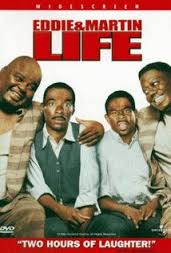
LIFE
US, 1999, 108 minutes, Colour.
Eddie Murphy, Martin Lawrence, Nick Cassavetes, Ned Beatty, Clarence Williams.
Directed by Ted Demme.
Life is a prison film, spanning 65 years. Eddie Murphy portrays a young conman in Harlem in 1932. Martin Lawrence portrays an edgy young man who wants to become a bank clerk. They are threatened because they cannot pay their bills in a Harlem nightclub, get the chance to redeem their lives by going to Mississippi to pick up some bootleg whiskey. However, they lose their money, are framed for killing a local card sharp and imprisoned for life.
The film highlights 1932, makes a transition to 1944 and then (with collages to indicate the passing of the decades) comes to 1972. There is a climax with the two 90-year-olds finally escaping from prison. There are echoes of such films as The Shawshank Redemption and, especially, Cool Hand Luke.
The film was criticised as not being serious enough for a drama, comic enough for a comedy. However, the two actors with their comic touch do a whole lot of routines familiar from previous films and entertaining for black audiences. The film seems to be geared more for black American audiences who would enjoy the characterisation, the repartee, the interchanges. Non-American? reviewers found these routines rather tiresome. It seems a matter of sensibilities.
Eddie Murphy does this kind of routine without any difficulty at all. Martin Lawrence has appeared in such action films as Bad Boys, Nothing to Lose as well as more comic films. The film was directed by Ted Demi, director of such films as The Ref and Beautiful Girls.
1.Title of the film, the meaning of life, the life sentence, losing one's life and gaining it?
2.The tradition of American prison films, the South, Mississippi, the conditions, the punishments, the chain gangs, escapes? This film's variations on the tradition?
3.The atmosphere of New York and Harlem in the '30s, the nightclubs? The contrast with the South, the clubs, Mississippi, the courts and prison? Escapes? The contrast with 1972 and the changes in civil rights, appearances, clothes, technology ...? The contrast with the 1990s? The musical score, the songs?
4.Time passing, the ageing and changes in the two central characters? The collages, especially of the '40s to the '60s?
5.The film as the equivalent of a shaggy dog story, the narration by the old man at the graveside and the two gravediggers listening? The audience being misled - the tone of the film, the comic touches, the serious touches? How well did they blend?
6.The Harlem nightclubs, the singers, the owners, the money? Claude and his girlfriend, not being engaged? The threats to his non-payments, the prospect of the job? Ray, conman, stealing Claude's wallet, no money? Spanky and his confronting them? Claude being dumped, saved by Ray's patter? Spanky's mission for the two?
7.Driving to Mississippi, stopping at the diner and the dramatisation of prejudice, the rednecks in the diner? Picking up the whiskey, going to the club, Ray and his being cheated? Claude and the sexual advances, losing his money? Their pursuing the conman, finding him dead? The group, Pike's arrival, the arrest? The audience knowing that Pike had confronted the conman, wanted to run him out of town, the scar on his face? The cover-up? The two protesting their innocence, going to jail? The life sentence?
8.Ray and Claude and their differing personalities, the initial clashes, the blame, Ray saving Claude's life, Claude's resentment (and not including him in the appeals)? The discussion about 'we'? The underlying friendship despite the clash, 28 years of not talking to each other? The memories of the past, Ray not taking the gun from Dillard to shoot Claude, their both standing on the bottles, the reconciliation? The end and their bickering, their escape? A portrait of US cons?
9.Dillard and his speech, the boundaries, the gun line, his trustees, Bob and his doing whatever Dillard said? The harshness of the prison, the bosses? The digging of the ditches, the breaking of the stones? No escapes?
10.Claude and Ray as being innocent, the effect on them? The first night, encountering all the prisoners? At work, Claude tired? Ray and his confrontation with the big man about the corn bread, the fight? The change of attitudes and the prisoners becoming friends? Their isolation, the long time together? The nature of their friendship? Telling stories - Ray and his Boom Boom Club, fuelling their dreams? The visualising of the Boom Boom Club and all the prisoners enjoying it, the music, the eating, dining, and Claude as the waiter? The spirit of the jail? Survival? The attempt at the escape with the map, the little girl saying they should go in the hole?
11.The transition to the '40s, the arrival of the mute Can't Get It Right? Claude and his baseball coaching, the matches, Can't Get It Right and his skills? The attraction to the governor's daughter? Her giving birth, the reaction of the governor, the search for the paternity, all the prisoners claiming the paternity? The deal for Can't Get It Right, the white promoter, his discussion about black players in the league, his getting the prisoner out but leaving Claude and Ray?
12.The personalities of the various prisoners, their way of speaking, dominance, eating, fighting? Jokes? The homosexual issue? The young man and his scarf? The irony of his being allowed and his not wanting to go, not wanting to return to his mother - running and getting shot? The '40s and the atmosphere of World War II?
13.The years going by, the two not talking? Survival, the bottles, the relief of making friends again?
14.Their being transferred in 1972, working for the governor, the garden, the house? The irony of Sergeant Dillard still there, the same speech to the newcomers? Ageing? The collage of the prisoners and their disappearing (literally) from the scene? The new governor as pleasant, the brochure and his talking about retirement and his apology for offending Claude? Ray and Claude still clashing, Ray assuming he had an escape plan? Claude and his driving the governor, seeing the '70s from the outside, the car, the suit, the people, the changes in civil rights?
15.The arrival of Pike, his boorish redneck attitudes, the scar on his face? The hunt, flushing out the birds? The irony of his watch and Ray realising it was his father's, taken from the conman? Pike wanting to shoot Ray after ridiculing him and saying that the state had forty years of labour from each of them? The governor shooting him dead? The cover-up, explaining to the authorities, promising the pardon - and the irony of his dying?
16.The two in the old folk's home, the atmosphere of the '90s, playing cards, talking, reminiscing, the television? Claude's plan, the fire, Ray rushing back in? The explanation of the bodies from the morgue, their being buried? The irony of their going to New York, Yankee Stadium, watching the match? The end of their life?
17.The history of prison movies, familiarity to audiences, the reality of the prisons, the justice system, the oppression? Change? Paralleling the changes for African Americans and civil rights? A satisfactory blend of the serious and the comic?
Published in Movie Reviews
Published in
Movie Reviews
Tagged under
Saturday, 18 September 2021 19:32
Lies of the Twins
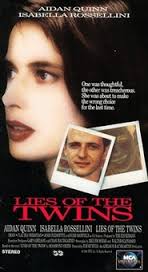
LIES OF THE TWINS
US, 1991, 93 minutes, Colour.
Aidan Quinn, Isabella Rosselini, Iman.
Directed by Tim Hunter.
An entertaining, if conventional, telemovie. It focuses on a fashion model, a made-to-measure role for talented model Isabella Rosselini. She shines in this film - and is reminiscent of her mother, Ingrid Bergman. The focus of her obsession are twins, nicely played by Aidan Quinn with minimum of difference, but essential difference. Each is a psychiatrist, the younger more gentle, the older more ruthless. The model is attached to one, becomes obsessed by the other - leading to a violent confrontation.
Also in the cast are Iman, the successful African model, and Hurd Hatfield as the models' manager.
The film was directed by Tim Hunter who made an impact with his youth films, the tenial Tex and the somewhat savage The river's Edge. Here he is working within the conventions of a popular telemovie.
1.Interesting and entertaining telemovie? The focus on obsession, on twins and their psychological bonding?
2.The world of fashion models, filming and photography? The world of psychiatrists? Affluent world? Lavish sets and homes? The California coast? Musical score?
3.The title and its focus? As applied to Jonathon, as applied to James? As perceived by Rachel?
4.Isabella Rosselini as Rachel, the successful model, her style? Her friend and their confidences? Telling the story, the flashbacks? Remembering her encounters with Jonathon and the relationship with him? Her relationship with Gil? Her wanting to get into the business and her success? Her personal crises, Jewel asking her to stop modelling? Her having to face her obsessions?
5.Rachel and her therapy, Jonathon as therapist, not having much wrong with her? Dating, sharing, falling in love? The proposal and her moving in? The domestic life at home? Jonathon's busyness - and their going for the free night to the luxury hotel? The Art Gallery and her slapping James, her embarrassment? The fascination with James? The meetings, the resistance, the affair? Her covering the affair? Jonathon and her discussions, wanting the truth? Her relying in confidence on her girl friend? Going to the party, her not feeling welcome, her snub to the hostess? The talk with the wife, the information about Sandy? Looking in the files? Her visit to Sandy, her discussions with her mother? Talking to Jonathon and hearing the truth? His harshness towards Sandy yet sending her the money? The news of his father's death? James' phone call and his deceiving Rachel? The tension between the two, the separation from Jonathon? The meetings, James? Her wanting to break with him? The build-up to the confrontation, the violence and the shooting? Her visit to James's grave - her leaving and her future?
6.Jonathon, therapist, psychiatry? Pleasant, the relationship, loving Rachel? Hard work, the relaxation at the hotel? His courses? His not mentioning James? The discussion, the tension, the long enmity? The information about Sandy, talking with Rachel? His anger with her? His father's death and his return? The separation - the shoot-out and the irony of his death?
7.The contrast with James, tough, women, psychiatrist? The affair, the reckless driving, flaunting himself with Rachel? The phone calls and his pretence? The shooting - the headstone at his grave? His visit - and the irony of his survival?
8.The world of modelling, Rachel and her friend, support?
9.Gil, his talent, recognising surfaces, interviews for models, business management, telling Rachel not to do the work? Her tension, emotions, the tiger? His recognition of what was going on?
10.The party, the psychologist and her book, her seductive style, Rachel's harsh words to her? The discussion with the discontented wife?
11.The visit to Sandra, her disability, her mother, taking the money from Jonathon? The effect on Rachel?
12.Rachel and her studying the books about twins? The relationship, older and younger, domination? Shared experiences, betrayal? Her obsessions - leading to destruction?
Published in Movie Reviews
Published in
Movie Reviews
Tagged under
Saturday, 18 September 2021 19:32
Licence to Kill
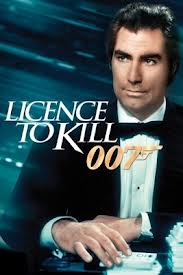
LICENCE TO KILL
US, 1989, 133 minutes, Colour.
Timothy Dalton, Cary Lowell, Robert Davi, Everett Mc Gill, Anthony Zerbe, Wayne Newton, Benicio del Toro.
Directed by John Glen.
Licence to Kill is the second James Bond film with Timothy Dalton as James Bond. It is the fifth film to be directed by John Glen.
The film has spectacular action as always, as well as tongue-in-cheek dialogue. However, the villain is not some world power-hungry maniac. The power-hungry maniacs of the '80s were the millionaire drug tycoons. This film focuses on that issue - which makes it basically more credible. The setting is Florida and Central America.
Bond goes through his usual adventures and destroys the villain. He is assisted by an attractive agent, as well as by the mistress of the tycoon. There is an assorted array of villains including Anthony Zerbe as a smuggler. Desmond Llewellyn has a good role as Q.
The formula has worked by this time for almost 30 years and audiences still enjoy the routine spectacle and adventure of a James Bond film.
1.The popularity of the series, the formula and the ingredients? Timothy Dalton's particular style and presence as James Bond?
2.Location photography, Panavision, gloss? The world of James Bond, agents, drug tycoons? Florida, Central America?
3.The importance of the stunts: the initial stunt with the plane and the helicopter? The sharks, the boats, the underwater photography? Explosions? Tankers and vehicles, planes?
4.The musical theme, the theme song? Musical score?
5.The prologue with Felix and Della about to be married, Bond and Sharkey present? The alert, Sanchez, the confrontation, the plane and the capture by the helicopter? The wedding and literally dropping in? The wedding cake?
6.Sanchez and his wealth, his pursuit of enemies, killing them? His being captured, the $2,000,000 bribe to the American police, the rescue and the underwater escape? The taking of Leiter, the torture, putting him to the shark, killing his wife?
7.Timothy Dalton as Bond: style and manner? The initial adventure, leaving, the news about Felix and his wife, the return, the relentless pursuit of Sanchez? The British government trying to stop him? The rendezvous with Pam? On the boat with Sharkey - and Sharkey's death? Lupe and Krest, the boat? Going to the city, investing in the bank, the casino? His attempt to kill Sanchez - and the reaction of the undercover Hong Kong police? Q and his artillery and gadgets? Befriending Sanchez? Lupe's attraction and help? The trip to the drug centre? The former fight with Dario, seeing him again, the ultimate fight, explosions, vehicle pursuits? Pam and her help? Lupe - and her final decision to go with the president? The happy ending?
8.Pam and her work for Felix, her skills, pilot, meeting him, the escape, the bulletproof vest, flying him in, posing as his secretary, jealousies, helping Q? In the final rescue?
9.Lupe and Sanchez, his initial jealousy and pursuing her? With Krest on the boat? Helping Bond? Betraying Sanchez, going off with the president?
10.Sanchez and his drug empire, wealth, going out of his territory and being caught, the escape, the bribes, the sharks, in the city, the bank and the casino, friendship with Bond, the meeting with the Asians, the trust? His henchmen? Blown up?
11.The portrait of Dario and the various thugs? Sadistic? Keller and his advice, his betrayal? The meek accountant and his brilliance, trying to save the money, his death?
12.Krest, his money, running the drugs, the boat? His being destroyed? Tricked by Sanchez - and his violent death?
Published in Movie Reviews
Published in
Movie Reviews
Tagged under
Saturday, 18 September 2021 19:32
Les Liaisons Dangereuses
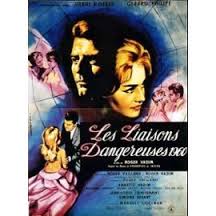
LES LIAISONS DANGEREUSES
France, 1959, 106 minutes, Black and White.
Gerard Philippe, Jeanne Moreau, Annette Vadim, Jean Louis Trintignant.
Directed by Roger Vadim.
Les Liaisons Dangereuses is an updating of the classic pre-French Revolution novel of Choderlos de Laclos. It received great notoriety in the '80s with the theatrical adaptation by Christopher Hampton and his adaptation of his play for the screen, directed by Steven Frears, starring Glen Close and John Malkovich.
This updating is by Roger Vadim at the beginning of his career, his notoriety as a director of films focusing on sexuality and the exploitation of his stars (who often became his wives): Brigitte Bardot, Annette Stroyberg (who stars in this film).
The film came out at the same time as Fellini's La Dolce Vita - and they relate in theme in their observation of contemporary decadent European society.
The film stays close to the outline of the original and updates it satisfyingly. Jeanne Moreau is the evil Jeanette. Gerard Philippe, in one of his last films, is Valmont. Annette Stroyberg is Madame de Tourvel, their victim. Jean Louis Trintignant (who appeared in earlier Vadim films) appears as Danceney.
The film has a prologue in which Vadim himself appears and comments about the morality and amorality of his characters, especially Jeanette. It is an interesting comment on Vadim's understanding of his film, as well as his understanding of the audience and its possible reception. The film is strikingly shot in black and white and has a musical score, much of it played by the celebrated jazz artist Thelonius Monk.
1.The work of Roger Vadim? Sex, corruption? France in the '50s and '60s? Comment on European society?
2.The original novel, the French Revolution setting? The decadence before the revolution? The adaptation and updating? The ironies of the initial comment from the novel and their ironic applications to the '50s?
3.Black and white photography, French settings, the city, the towns, the ski resorts? Authentic atmosphere? Social observation? The use of the jazz score - especially in the club?
4.The title, relationships, genuine and controlled, the effect of such dangerous liaisons and their consequences?
5.The portrait of Juliet: Jeanne Moreau and her presence and style? Her life, influence on other people, her place in society? Her relationship with Valmont, home, her agreement, their power and sex games? Her relationship with the American? Affairs, honesty? Decadent lifestyle? Her friendship with the young girl and her corrupting her? The relationship with her mother? The student, his engagement, her seduction? Her observing of her husband? Arrival at the ski resort, her behaviour, constant presence, the dances and the meals? The discussions and their effect? Separating the two? The confrontation, her malice? The information, the wording of the telegram and her sending it? The scene at the club, the confrontation? The American? The burning and the irony of her being burnt - and the final comment on her scarred face as manifesting the evil of her soul?
6.Valmont as a contemporary rake, his charm, relationship with Juliet? Work, ambitions for overseas position? Diplomatic service? The play on words with reunion? His place in society, the games, his women and attractive charm? The young girl and her attraction? Going to the ski resort? The seduction? His encounter with Madam de Tourvel, attracted, courting her, her resistance? Genuine affection, games and reality? The lyrical scenes with her? The final seduction? The young girl and the tapes, her relationship with the student? Juliet's arriving? His being caught, trapped? The confrontation with Juliet, the decision, the telegram and his cowardice? At the club, drunkenness, dancing, violence, fighting? His death?
7.Madame de Tourvel and her Scandinavian background, integrity? On holiday, her companion? Family? Absent husband, her children? Her purity, religion? Attracted to Valmont? The skiing, the socialising, the lyrical sequences? Caught in his web, her suffering? The seduction? Her hopes, contemplating the divorce? The telegram, the grief? The news of his death? The future?
8.The girl and her lover, her mother, place in society, the sheltered education? Her age, seductive? The student and his serious-mindedness? Her going to the ski resort, socialising, with Valmont, learning from him and his wife, the tape, the seduction, the lies, her pregnancy? The student and his concern, going back to the city? The violent confrontation?
9.Danceney as student, his love for the girl, serious-mindedness? The lies, his becoming a victim? Juliet and her taking him on, earnest, her seduction? The truth and the confrontation?
10.The mother, her place in society, observation of people? Moral ambiguity?
11.The picture of French society, moving fast, amoral and immoral, questions of power, lust, games, flippancy? In the city, at ski resorts, in the club and its atmosphere of decadence? And the musical background?
12.French society as decadent in 1782? The applications to 1960? The points made? The observation? Enjoyment of observing this society? Moralising?
Published in Movie Reviews
Published in
Movie Reviews
Tagged under
Saturday, 18 September 2021 19:32
Wounded Man, The/ L'homme Blesse
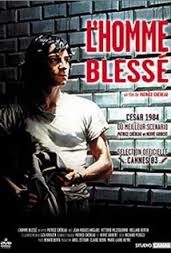
L'HOMME BLESSE (THE WOUNDED MAN)
France, 1983, 90 minutes, Colour.
Jean- Hugues Anglade, Vittorio Mezzogiorno, Roland Bertin.
Directed by Patrice Chereau.
The Wounded Man is a grim drama about people on the fringe of a European city. It was written and directed by Patrice Chereau (who acted as Desmoulins in Wajda's Danton). It focuses on a young man, alienated from him suburban and ordinary parents, aware of some homosexual drives who is fascinated by the fringe life at a railway station. He continues to return to the station, is the object of desire from an infatuated doctor, is introduced to a disturbed young man who is a pimp for men at the railway station. After many encounters, where the young man learns to be more assertive, he confronts the doctor, confronts the very disturbed friend and in a sexual assault, kills him. The film does not indicate what the future of this disturbed young man would be - except perhaps a repeat of the life of his victim.
The film is intense, well acted and directed. It is also quite explicit in presentations of homosexual sexual activity. The young man is played by Jean Hugues Anglade (Betty Blue). His disturbed friend is Vittorio Mezzogiorno (The Three Brothers). Veteran German actor Armin Mueller- Stuhl (who was to go to the US in the late '80s for a successful career) appears as the young man's father. A grim picture of fringe homosexual society.
1.Impact of the film? As drama? Characters? Relationships? Tensions, sexuality, violence?
2.The European city, homes, apartments? The railway station? The atmosphere of night? Darkness? The musical score?
3.The title - to whom did it refer? To the young man, to Jean, to Dr Bosman?
4.The focus on the young man, going to the railway station with his family, his relationship to his parents, their love for him, their lack of interest? His relationship with his sister? The scenes at home, his being bored? Restlessness at the railway station, wandering, noticing the doctor watching him? The incidents in the toilets, the meeting with Jean, the drink? His return and Jean's ambiguity? The violent physical confrontation? His missing his sister's departure, going home? The lack of response from his father? The parents planning the holiday? His ability to disappear? Not having any money? Going to the railway station, following the doctor, the discussions with him, the meeting with Jean, going home with him, Jean and Elizabeth, their night together, the physical confrontation? Jean and his talk about the police? As a pimp? On the beat, the clients at the railway station, the confrontation in the hotel, his leaving, his rushing home to get the money from his mother? The return and everybody disappearing? The young man at the railway station, the money, the knife and the kiss? The psychological effect of these experiences? Returning to Elizabeth? Meeting the doctor? Jean and his erratic behaviour? The doctor finally showing the young man to the room, his sexual assault of Jean, his emotions, the violence and his killing Jean? His future?
5.Jean, on the streets, at the railway station? The encounter with the young man, the drink, the wound, the sexual encounter? Robbing victims? His being taken home, with Elizabeth? Jean not wanting to be watched, yet the advances? His setting the young man up for clients, wanting the money? The voyeur and the pretended sexual experience? His collapse, drugs, the final assault and his death? Elizabeth, the relationship with Jean? Her love for Jean, her care for the young man?
6.The doctor, cruising the stations, the widower? His meal, his work? The relationship with the young man? His relationship with Jean? Setting him up? The final showing the young man to the room, his promising not to watch?
7.The clients, the cruising of the stations? The sexual encounters? Loneliness, lust, violence?
8.The young men at the railway station, prostitution, hotels? The police? The 20-year-old and the encounter with the young man, the money, the kissing, dispersing?
9.The family, their indifference to their son? Their not knowing where he was? Lack of concern?
10.The social comment about the quality of family life? Relationships? The margin, the people on the fringe, the world of homosexual prostitution?
Published in Movie Reviews
Published in
Movie Reviews
Tagged under